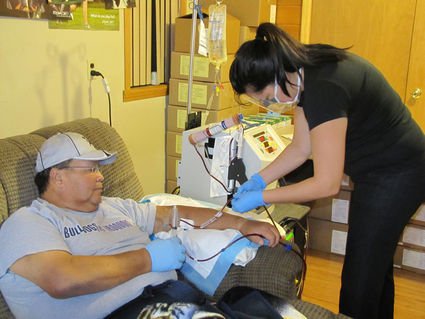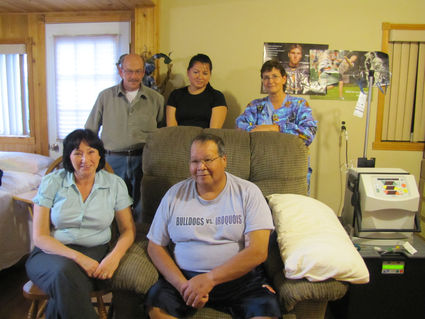Mann Jacobs becomes first home dialysis patient in Akwesasne

Mann Jacobs receives his dialysis treatment at home, with his daughter Tisha and friend Morris (not seen) administering.
Three years ago, Randall “Mann” Jacobs’ kidneys failed as a complication of Diabetes II. Every second day since then he’s had to visit a kidney dialysis center (in Massena and Ogdensburg) for regular dialysis treatments to do the job his kidneys once did. Those who have also suffered the loss of their kidney functioning or who have had a close relative experience it know the hardship and stress it can cause, and being required to visit a dialysis center several times a week can be a burden.
However, for the first time last week, Jacobs had his dialysis treatment at home, in the comfort of a recliner, with his daughter Tisha Thompson and his friend Morris Fassett, operating the hemodialysis machine and inserting and removing the tubes from Jacobs’ arm. Jacobs is the first person in Akwesasne, and only the third in the North Country, to begin home dialysis.
Although Thompson has studied nursing in Canada in the past, Fassett is a plumber from Constable with no medical experience. Both Thompson and Fassett committed to being Jacobs’ dialysis partners and the trio spent four weeks training at Ogdensburg’s dialysis center using NxStage - the company that manufacturers the home hemodialysis machines. Jacobs’ wife Rosalie and daughter Tara are also planning to be trained.
Last Thursday, Barbara Perretta, the trio’s teacher and trainer, was at Jacobs’ house in Raquette Point to supervise Thompson and Fassett as they conducted Jacobs’ first in-home dialysis treatment. He sat in a bedroom in his home on a big comfortable recliner with a large television on the wall in front of him.
Thompson and Fassett went through all the medical steps they’ve learned and hooked Jacobs up to the machine that would act as his kidney for three hours. Blood is removed through one tube and sent to the portable kidney to be cleaned and treated, the way a healthy kidney would. The clean blood is sent back up another tube and back into Jacobs’ arm.
Avoiding the long drives to a dialysis center and remaining in the comfort of his own home are some of the obvious benefits of home dialysis, but there are additional benefits as well. In order to save a patient multiple trips to a dialysis center, those centers remove the patients’ blood at a faster, more aggressive rate than the home dialysis machine does. The result is the patient feeling tired and wiped out for long periods of time. The gentler nature of the home machine means that Jacobs will have shorter treatments more days a week. The time he saves by not driving to a center makes up for the additional days he will have his dialysis treatments.
“Ever since I’ve been on here I’ve felt good,” said Jacobs of the home dialysis machine which he was switched to during their training. “It got so bad for me (in the past) because they take your fluid out so fast that the whole day is shot. The next day you’re feeling better and then the next day you have to go back. This (home dialysis) is a better quality of life.”
On Thursday morning, Jacobs completed his treatment at around 11 a.m. and planned to drive a tractor at 4 p.m. for a hayride at his grandchildren’s school, something he wouldn’t feel up to doing in the past after his dialysis treatments.

Home dialysis is covered through regular medical programs and insurance, but few North Country patients have opted to try it.
Perretta said the unfortunate reason many dialysis patients don’t seek in-home treatment is because they lack a committed partner to do the training with. That individual needs to be able and willing to administer the required care on a regular basis. Although no medical background is required, the individual must be open to giving medical care and be able to understand the readings and machine troubleshooting.

Clockwise: Morris Fassett and Tisha Thompson (caregivers), instructor Barbara Perretta, Mann Jacobs and his wife Rosalie.
“Not everyone can do this, said Perretta. “It takes a lot of commitment by both patients and partners. We have a lot of people who want to do it, it’s not having a partner.”
Anyone interested in learning more about in home hemodialysis can contact Perretta at the Ogdensburg Renal Center by calling 1-315-394-9718.





Reader Comments(0)